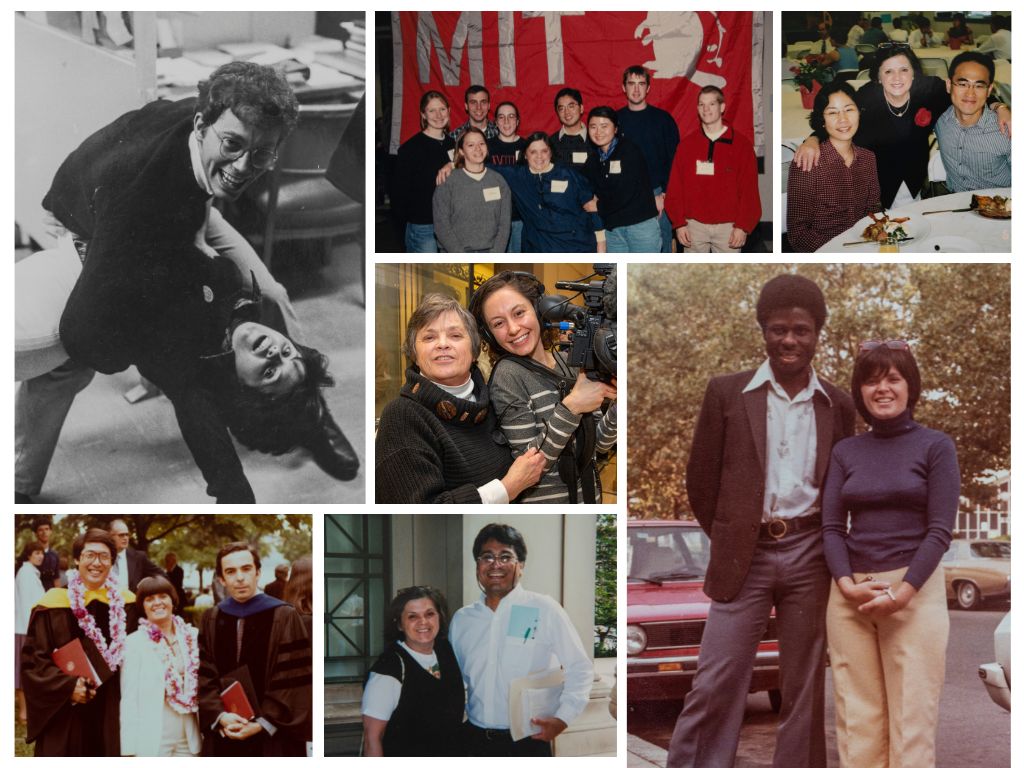Mary Beth Gallagher | Department of Mechanical Engineering
Dec. 14, 2022
After forty-seven years in MIT’s Department of Mechanical Engineering, Leslie Regan retired, leaving a legacy of care and compassion for generations of graduate alumni.
If you mention Leslie Regan’s name to any alum of MIT’s mechanical engineering graduate program, their face will break into a smile. For nearly five decades, Regan’s kind, caring presence was a mainstay for thousands of mechanical engineering students.
Regan joined MIT’s staff in September 1974. She started as an administrative assistant supporting three faculty members, including Professor David Wormley. It was in that role that Regan first discovered her love of working with students.
After Wormley became department head in 1982, Regan joined him in MechE headquarters. She spent four years working alongside Wormley, learning the ins-and-outs of the Institute’s policies and procedures. In 1986, there was an opening for the academic administrator in the graduate office and Regan seized an opportunity to get back to where she felt she belonged: working with students. “My heart was with the students. To me it was never really a job, it was a lifetime mission. I really loved seeing them grow and helping them if they had issues,” says Regan. As academic administrator, Regan helped countless graduate students navigate the often-tumultuous experiences of securing funding, passing qualifying exams, and finishing their theses. For many students, especially international students, she was a safe harbor far from home.
One such student was Shangzhi Wu SM ’81MBA ’84 PhD ’85. Wu was the first student from mainland China accepted into MIT after the Cultural Revolution. The week he was set to leave for Cambridge, Wu and his wife quickly got married in Beijing since there was so much uncertainty about their visas. The wedding took place in a civil office without a ceremony or reception. Two days later, Wu boarded a flight to Boston.
Over the next two years, Wu developed a close friendship with Regan. When his wife finally joined him in Cambridge, Regan organized the wedding party they never had.
“When Leslie learned that we never had an official wedding ceremony, she organized a party with many friends at her house,” says Wu. “We really appreciated Leslie’s friendship and kindness to organize that in her house.”
From Regan’s perspective, she gained just as much from her relationships with international students as they did from her.
“I just feel like we can make an impact no matter where we are. People would always ask me ‘Do you travel?’ And I say that I do. I travel all over the country and all over the world through the eyes of our students,” Regan says. “There’s no place I haven’t been. They come into MIT and I get to know their culture.”
As the years went on, Leslie became an institution within MechE. She ushered the graduate program from a time when master’s and doctoral theses were written on typewriters and copied on mimeographs, through to the digital age and the pandemic, which saw students defending their PhD theses on Zoom.
Over the years, her office on the first floor of MIT’s Building 3 became a shrine to the many students she cared for, helped, and mentored over the years. The walls were decorated with mementos sent from every corner of the world, and even beyond.
On one of his trips to the International Space Station, alum and former NASA astronaut Mike Massimino SM ’88 PhD’92 had the opportunity to bring an item tospace as a gift when he returned to Earth. He chose a t-shirt with MechE’s name on it in honor of the department’s – and by extension Leslie’s – impact on his life.
“Leslie made every one of us feel like family. I wanted to fly something for the department specifically, and Leslie had a lot to do with that because the department took care of me. They educated me and gave me these great opportunities,” says Massimino. “A lot of people come in-and-out of your life to make these things possible, and Leslie was one of them.”
After decades of keeping the graduate office running, Regan is adjusting to the slower pace of retirement. She has been cleaning and organizing boxes and boxes of keepsakes, including dozens of cherished letters and emails from alumni. She also is very active in her church community and keeps busy with volunteering.
When she reflects on her career at MIT, Regan only has positive things to say about each student she worked with.
“I never felt like this was a job. I felt this is really the place I should be and I loved every minute of it,” says Regan. “Some people would say to me, ‘There must be one student you didn’t like.’ And I would say never, not one. Sure, their needs are different, but I cared for every single student who went through our program.

